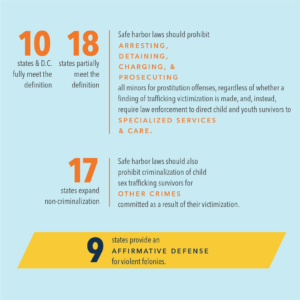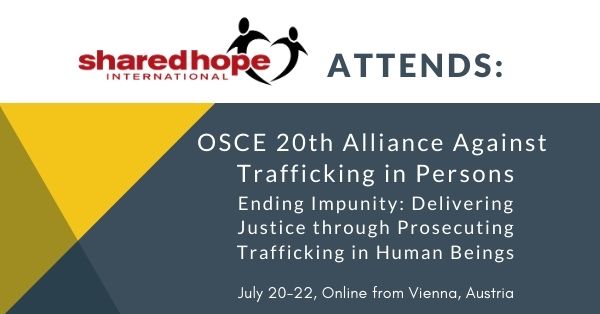Lack of Consistency in Child Sex Trafficking Laws May Hurt Our Children
By Christine Raino and Eliza Reock
What’s in a name? A lot, actually. In the area of anti-sex trafficking law and policy, words and definitions matter. They have the ability to affect thousands of lives of individuals who have survived sex trafficking. In recent years, policy makers and anti-trafficking advocates around the nation have been celebrating the success and passage of “Safe Harbor” laws . . . the problem? No one knows what that means.
After over 20 years in the fight to combat sex trafficking and protect victims, Shared Hope recognizes the importance of language. For instance, we see the vast difference between the response to a child thought to be a victim of sexual exploitation and that same child if he or she is instead labeled a “child prostitute.” A simple change in terminology–from “child prostitute” to “child sex trafficking victim”–alters subconscious impression. Since the release of our 2009 National Report on Domestic Minor Sex Trafficking, Shared Hope has been working with law enforcement, service providers and policy makers to imprint this understanding and assure that adults working with trafficked children recognize them as victims and not perpetrators of a crime. Yet, 23 states still have laws that allow children to be charged with prostitution and other crimes related to their trafficking abuse, effectively criminalizing them for the same conduct that makes them a victim of a crime. Laws matter. This conflict in the law is confusing and complicates our response.
Does this 23 state statistic surprise you? Well, you may be surprised because many states claim to have fixed the problem by enacting a “safe harbor” law. But what does it really mean to pass a “safe harbor” law? Unfortunately, this term has no single, clear meaning. Current “safe harbor” laws range all the way from an affirmative defense with no clear path to services, to comprehensive laws that respond to sex trafficked kids through various points of contact and mandate access to specialized services. As a result, the term “safe harbor” has become a catch-all phrase for any attempt to reduce criminalization of minors for prostitution—some of these laws are progressive and comprehensive and others fall far short of what is needed to truly protect child victims.
The term originates from the very first law enacted to protect juvenile sex trafficking victims from criminalization, the New York Safe Harbor law, enacted in 2008. This law allows minors to be charged with prostitution and directed into an adversarial court process in order to access services, and was definitely not the original goal of the bill. When survivor advocates set out to establish this new protection for sex trafficked youth and Assembly Bill 5258 was introduced, it would have eliminated criminal liability for minors for prostitution. Non-criminalization was the goal of the bill, and even though that’s not where the bill ended in 2008, that should still be the goal – for every state. Unfortunately, this incomplete response became the jumping off point for other states’ attempts at protecting minors from criminal liability, many of which continued to use the “safe harbor” terminology.
One of the risks of continuing to utilize an ill-defined term, and giving states credit for “safe harbor” laws without closely examining the structure of those laws, is complacency–the sense that the issue has been addressed–yet there is not one single state that has worked out a highly effective response to juvenile sex trafficking. Nevertheless, the lack of a perfect model is not a reason to stop moving forward and it is exciting to see states taking initiative in the law to address the unfair penalization of juvenile sex trafficking victims.
This is not a simple process and it requires a long term commitment as well as the willingness to keep assessing, evaluating and improving the laws necessary to protect juvenile sex trafficking victims. It is critical to maintain two clear goals at the core of the effort to draft truly effective child protective responses: (1) comprehensive laws that eliminate criminal liability for minors for prostitution and other nonviolent offenses related to their victimization, and (2) provision of an avenue to specialized services for trafficked youth.
 Shared Hope has created useful tools that help educate advocates to understand their state laws meant to protect children who have been trafficked. Even if your state has a “safe harbor” law, examine the law to see if it meets the above named goals and if not, let your officials know that a bill name is not a victory. Join us in demanding that all states have legislative frameworks that undeniably and unequivocally provide justice for all child sex trafficking victims
Shared Hope has created useful tools that help educate advocates to understand their state laws meant to protect children who have been trafficked. Even if your state has a “safe harbor” law, examine the law to see if it meets the above named goals and if not, let your officials know that a bill name is not a victory. Join us in demanding that all states have legislative frameworks that undeniably and unequivocally provide justice for all child sex trafficking victims
Related Research:
JuST Response Council Protective Response Model Field Guidance
Justice for Juveniles Field Guidance
Non-Crimiminalization of Juvenile Sex Trafficking Victims Policy Paper







